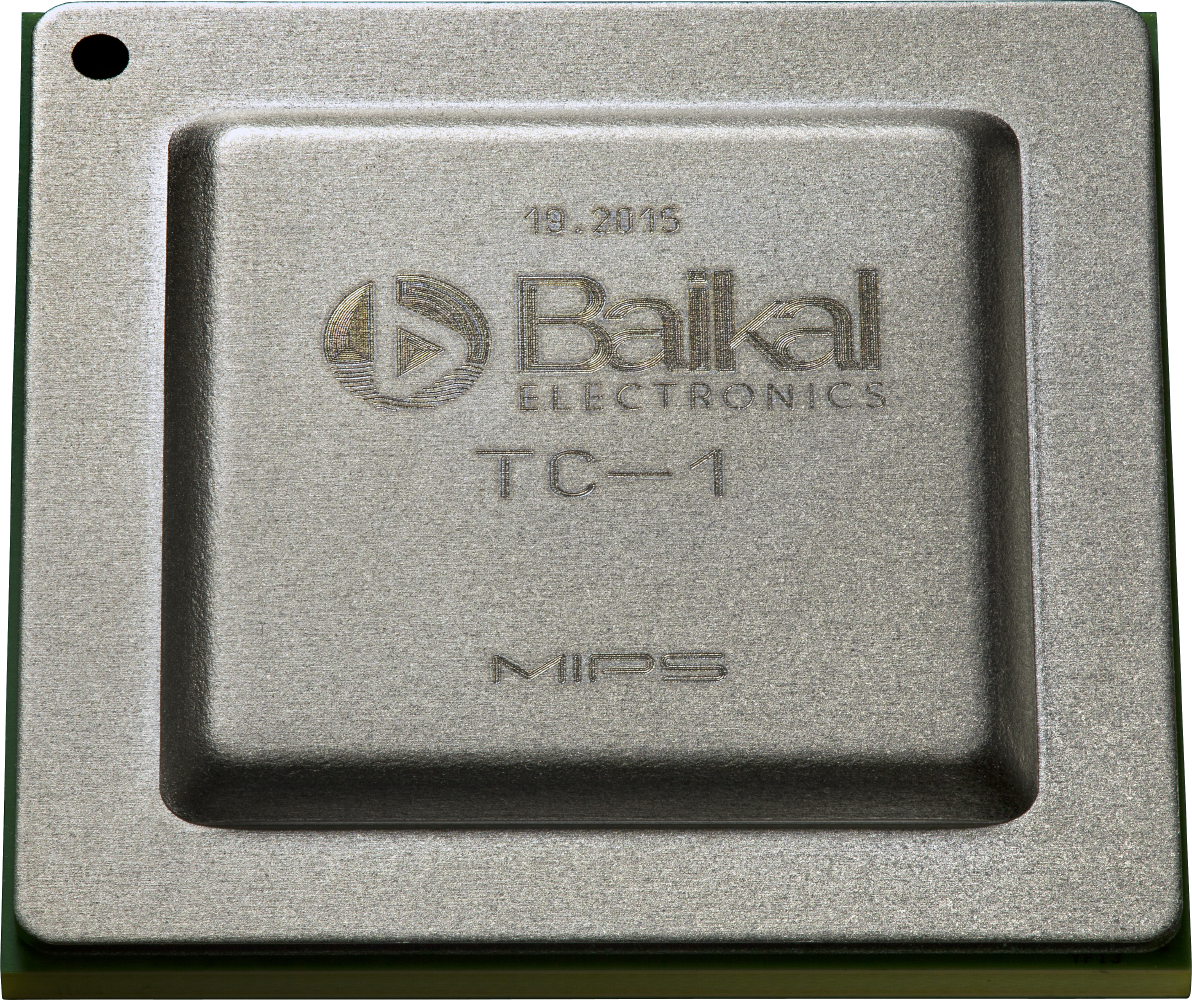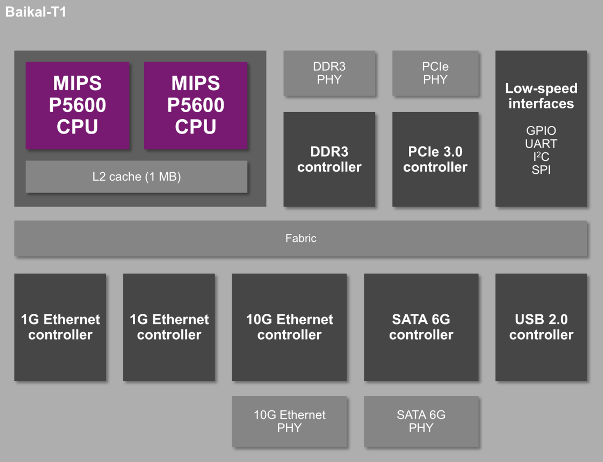Russian 'Baikal-T1' Chip Comes With Dual-Core MIPS CPU And OmniShield Support
Last year, the Russian government announced that it doesn't want to rely on Intel and AMD chips from the U.S. anymore and will focus more on using homegrown chips from Russia.
At the time, Russia's Industry and Trade Ministry announced that it intended to use chips from the Russian company Baikal Electronics, which was supposed to produce an eight-core chip for 2015 that would utilize ARM's 64-bit Cortex-A57 processors at a 2 GHz frequency per core.
Whether that plan is still in place or not is unclear, but the company's first chip this year includes a MIPS rather than an ARM CPU. The two companies have recently announced that the Baikal-T1 chip will utilize a dual-core 32-bit MIPS P5600 CPU that's clocked at 1.2 GHz.
Imagination's P5600 MIPS processor appears to do quite well in a performance/per MHz race, but given that it is a last generation 32-bit CPU (Release 5) and clocked at only 1.2 GHz, it's unlikely it would have won against a 64-bit 2 GHz Cortex-A57 from an absolute performance point of view. There are also only two cores, as opposed to the planned eight cores for the ARM-based chip.
Baikal may still intend to use the ARM Cortex-A57 for personal computers and micro-servers as originally planned, but for networking devices that eight-core 2 GHz chip would be overkill, which is why it's likely going with the lower-performance MIPS processor. Imagination's MIPS CPUs also tend to be preferred in networking devices, and the company has more experience in this market than competitors.
The Baikal-T1 chip, which will utilize a dual-core MIPS CPU will only use up to 5W of power. This makes it appropriate for networking equipment or other fanless designs. The chip also includes multiple high-speed (1G/10G Ethernet, PCIe, SATA 6G, USB) and low-speed interfaces (GPIO, I2C, UART, SPI). The 25 x 25 mm package is manufactured on a 28nm process.
The MIPS P5600 CPU supports Imagination's recently announced "OmniShield" security solution that can utilize up to eight different security domains to isolate applications and other software from harming each other. It also supports a 128-bit SIMD engine as well as Enhanced Virtual Addressing (EVA) and Extended Physical Addressing (EPA), which help the 32-bit CPU overcome its memory limitations.
Get Tom's Hardware's best news and in-depth reviews, straight to your inbox.
Imagination believes that the Russian company's adoption of MIPS CPUs will convince the Russian government, which spends $1.3 billion annually in computing technology, to invest further in acquiring MIPS-based processors and devices.
Follow us @tomshardware, on Facebook and on Google+.
Lucian Armasu is a Contributing Writer for Tom's Hardware US. He covers software news and the issues surrounding privacy and security.
-
SirTrollsALot Perhaps Russia should get out of the military maneuvers. And focus their efforts on aquiring people from around the world to make better stuff for example computer technology. But then again who wants to live in Russia, let alone invade them. I jsut dont get Russia sometimes...Its like they got 1 foot stuck in the past and their pinky finger in the present...Reply -
Shankovich ReplyPerhaps Russia should get out of the military maneuvers. And focus their efforts on aquiring people from around the world to make better stuff for example computer technology. But then again who wants to live in Russia, let alone invade them. I jsut dont get Russia sometimes...Its like they got 1 foot stuck in the past and their pinky finger in the present...
That's because they're still the USSR. State run internet, Putin propaganda. Ask anyone who grew up in south or parts of central Europe 20 years ago. Russia is slowly going back to full Russian communism
-
Larry Litmanen ReplyPerhaps Russia should get out of the military maneuvers. And focus their efforts on aquiring people from around the world to make better stuff for example computer technology. But then again who wants to live in Russia, let alone invade them. I jsut dont get Russia sometimes...Its like they got 1 foot stuck in the past and their pinky finger in the present...
Just for the record, Iraq and Afghanistan.
-
falchard Seems a little dumb. Both Intel and AMD are international companies. Heck some Intel CPUs may never see an American Engineer working on them. Dumber part is that Russian Computer Scientists tend to just take what someone else did and integrate into their systems without first looking it over. For instance those Baikal chips use a significant amount of controllers, languages, and instruction sets written by US Computer Scientists.Reply
Its much less likely that an international company that does business in liberal countries would have government controlling elements written into it. Its also even more unlikely that these companies would voluntarily allow this as it would slow down their chips. Then its drastically more unlikely that the US can force these chip makers to do such since non-compliance is not criminal. -
Alexandru Voica ReplyI wonder how 'similar' this is to the Loongson.
Actually quite different. The company that designs Loongson has an architecture license while Baikal uses off-the-shelf MIPS CPUs. -
cortes_ ReplyThat's because they're still the USSR. State run internet, Putin propaganda. Ask anyone who grew up in south or parts of central Europe 20 years ago. Russia is slowly going back to full Russian communism
Specialist in Russian culture and politics? My family live in central Europe, and there is no problem. This is your government says so far about the Russian communism and totalitarian regime, and you willingly believe.
-
stevenrix In a globalized world it's becoming harder not to be technology-independent. Some countries already had tried to do that in the past (Thomson CSF with their 486DX33, Cyrix and so on just to name a few of them) but their market was only public. In a market that supplies only the government, I do not remember this has previously happened, but the demand actually exists so this company might have far better chances to survive. There is a mistrust from many countries towards western nations (USA and Europe included) when it comes to technologies and chips, so it is perfectly understandable those emerging tech countries will give them a national preference. This is also what China does lately, and China is imposing higher tariffs on western companies to make business with them. The technological independence is also an exit strategy to undermine a unipolar world that is entirely westernized.Reply -
stevenrix In a globalized world it's becoming harder not to be technology-independent. Some countries already had tried to do that in the past (Thomson CSF with their 486DX33, Cyrix and so on just to name a few of them) but their market was only public. In a market that supplies only the government, I do not remember this has previously happened, but the demand actually exists so this company might have far better chances to survive. There is a mistrust from many countries towards western nations (USA and Europe included) when it comes to technologies and chips, so it is perfectly understandable those emerging tech countries will give them a national preference. This is also what China does lately, and China is imposing higher tariffs on western companies to make business with them. The technological independence is also an exit strategy to undermine a unipolar world that is entirely westernized.Reply


